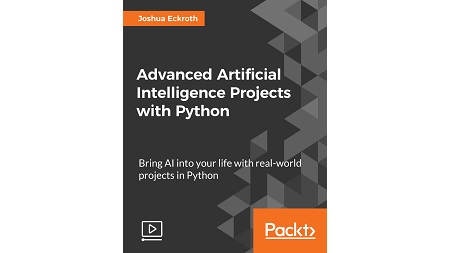
English | MP4 | AVC 1920×1080 | AAC 44KHz 2ch | 2h 02m | 503 MB
Enter and explore the fascinating world of intelligent applications with Artificial Intelligence using the Python programming language
Considered the Holy Grail of automation, data analysis, and robotics, Artificial Intelligence has taken the world by storm as a major field of research and development. Python has surfaced as a dominate language in AI/ML programming because of its simplicity and flexibility, in addition to its great support for open source libraries such as spaCy and TensorFlow.
This video course is built for those with a basic understanding of artificial intelligence, introducing them to advanced artificial intelligence projects as they go ahead. The first project introduces natural language processing including part-of-speech tagging and named entity extraction. Wikipedia articles are used to demonstrate the extraction of keywords, and the Enron email archive is mined for mentions and relationships of people, places, and organizations. The spaCy library is used. The next project introduces genetic algorithms. The DEAP library is used. A music data set is used in a genetic algorithm that generates a music playlist satisfying multiple criteria such as song similarity and playlist length. The last project introduces reinforcement learning and deep reinforcement learning. The OpenAI Gym platform and Q-learning algorithm are used to build a game-playing AI.
Built for AI enthusiasts, machine learning and deep learning students, and developers across three realistic projects, this course covers modern techniques that will take your AI game with Python to the next level.
What You Will Learn
- Extract names, places, and more and their relationships from text
- Build a recommendation engine for finding new music
- Use deep reinforcement learning to build an AI that plays arcade games
- Employ the SpaCy and textacy libraries for natural language processing
- Use popular libraries such as Keras and TensorFlow for reinforcement learning
Table of Contents
01 The Course Overview
02 Goals and Techniques of NLP
03 Keyword Extraction
04 Keyword Extraction from Wikipedia
05 Entity and Relationship Extraction
06 Extracting Entities and Relationships from Email
07 How Genetic Algorithms Work
08 Python DEAP Library
09 Music Analysis with the Essentia Library
10 Generating a Mix Tape with a Genetic Algorithm
11 How Reinforcement Learning Works
12 Q-Learning
13 Creating a Game Player with Reinforcement Learning
14 Deep Reinforcement Learning
Resolve the captcha to access the links!